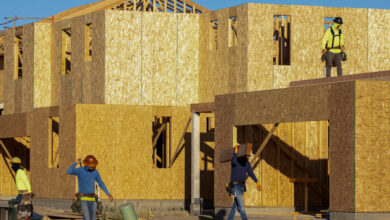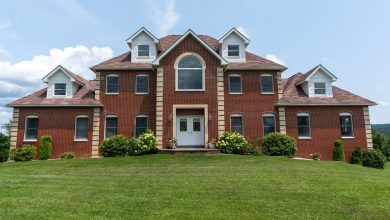The First Step to Get Off the Streets? A Room of His Own.

[ad_1]
Theron Truluck has everything he needs, for now, in his 425-square-foot apartment in the Bronx. The modest dorm-style room, with white walls and red-tiled floors, comes with a mini fridge, a microwave, a sink, a twin-size bed, a desk and an armoire. He also has access to a shared shower and bathroom, a community kitchen, and his building has a computer room when he wants to use the internet.
Mr. Truluck, 52, does not own a phone or earn an income, but his home has given him four walls and a roof so he can stay warm. It also provides him with the structure he said he needs to try and overcome more than a decade of chronic homelessness and addiction to alcohol and drugs, like PCP and cocaine, so he can move forward with his life goals.
Mr. Truluck was living mostly on the Q train when he was approached by a city outreach worker at a station on Coney Island in November 2022. He told the outreach worker he was homeless and cold, and that he didn’t like living in some of the city’s homeless shelters, where he had experienced a lot of violence. He recalled being attacked, robbed and nearly sexually assaulted at one shelter in Harlem in 2018.
Following that encounter with the outreach worker, and a monthlong stay at a city low-barrier homeless shelters in Brooklyn, where he received a range of supportive services, Mr. Truluck was placed in the city’s newly formed Streets to Housing pilot program, run by the city in partnership with Volunteers of America-Greater New York. The program is based on the housing first model, a strategy to address rising rates of unsheltered homelessness.
Through housing first, individuals experiencing homelessness are moved into permanent housing without preconditions or barriers to entry that often come with a number of needed support services.
New York’s pilot program provides permanent housing to 80 unsheltered homeless people, including Mr. Truluck, along with supportive services such as job training, medical or mental health care, and substance abuse treatment. The program helps them obtain documents needed and also connects them to rental assistance.
Program participants live in Volunteers of America-Greater New York residences in Brooklyn and the Bronx. The program serves a fraction of the city’s unsheltered homeless population, which was estimated at about 3,400 people on a single night in January 2022, according to an annual survey of all homeless individuals in the city.
Mr. Truluck was among the first program participants to move into a new apartment at VOA-Greater New York’s Commonwealth Residences complex. His rent is $1,849, which is covered by city rental assistance and public assistance programs.
On a Tuesday afternoon in November, a man sang loudly as he entered the Commonwealth Residence, a large brick building on the quiet tree-lined Commonwealth Avenue in the Bronx. The 149-unit residence provides permanent, supportive housing to former homeless people, including those with a mental illness. Residents typically move into the home after spending a year or more at a shelter.
That day, Mr. Truluck was wearing a black beanie, a gray sweatshirt and pants, saying he likes to work out in his room, doing push-ups and curls, and to jog around the block.
He’s made his apartment comfortable. A light blue blanket neatly covered his bed. A phone charger snaked from the wall onto the top of his bed, even though he said his phone was stolen while he was asleep on the train a couple of months ago.
He used to have a TV in his room, but he had to throw it out because it was infested with roaches. A wrestling poster, and various prints of Black art decorate the wall over his desk, including the painting, “The Sugar Shack,” which was depicted in the 1970s sitcom, “Good Times.” Photos of several female music stars, including Kali Uchis and K-pop group Mamamoo, hang above his sink.
$1,849; $0 with government subsidies | Saint Lawrence, Bronx
Theron Truluck, 52
Occupation: Unemployed
On career ambitions: Mr. Truluck wants to return to his former profession as a barber, eventually opening his own mobile barbershop to serve people at day care centers, nursing homes, after-school programs, and people experiencing homelessness. “I want to go down to the subway and give people haircuts. I’m going to go viral,” Mr. Truluck said, adding, “A haircut will lift your spirits up, give confidence, make you smile, make you want to go out and do something.”
On peace of mind: On the train, Mr. Truluck often woke up to find strangers staring at him. At times, he was robbed or verbally and physically abused, and was scared. At the Commonwealth Residence, he can escape into his room by closing the door and meditating. “When I got here, this was like peace of mind so I could move forward,” he said.
Mr. Truluck has been in and out of homelessness since 2010, while living in Camden, N.J., Philadelphia and New York City, a few years after his 6-month-old daughter died during a car accident involving a drunken driver — a traumatic event that accelerated his addiction.
“I went to a dark place,” he said. “That’s when I started drinking, cocaine, that’s when my addiction started to develop.”
Mr. Truluck rode the subway on and off between 2019 and 2022. Life on the train was scary and challenging, but also doable. On many occasions, he woke up to find the clothes he had been carrying and his phone had been stolen. Some people yelled at him, telling him to get a job. He recalled being kicked in the head once while sleeping. Other times, he would find food and money that had been left for him by fellow riders.
Other riders often told him where he could find resources, such as food or clothes, and he was able to find places where he could wash up. He recalled partying on the Q train with around 20 other homeless individuals, complete with food and alcohol.
Trying to turn your life around and confront society when you’re homeless and living on a train is hard, Mr. Truluck said. “Everybody is judging,” he said. “Your self-esteem is down because you’re dirty, you don’t got nothing clean.”
He has relapsed twice since entering the Street to Housing program. The latest occurred in May after his adult son died suddenly. He reached out to a program social worker, who helped check him into a rehab center in Albany for 45 days.
Managing that grief has been difficult, especially after his romantic partner died while he was at the rehab center. But for the last 90-plus days, he’s managed to stay clean.
At the moment, Mr. Truluck is staying focused on working with Volunteers of America to get his affairs in order.
He held up a piece of paper from his desk, which listed action items he needed to do, including going to places in Harlem and the Bronx for mental health services, job training, schooling, a winter coat, medical services, and a New York ID.
“These are things I’m supposed to do,” said Mr. Truluck. “I visualize them, write them down, and do them.”
He’s motivated by his four living children and his 3-year-old grandson, and the dream of restarting his career as a barber. He said relatives out of state ask when he’s going to visit. But he’s trying to focus on himself first. “How can I take care of anybody if I can’t help myself?” he asked.
Mr. Truluck considers the Commonwealth Residence a steppingstone until he can one day move out and live on his own, and be in his new environment without being triggered. But he expects to stay there for a while — hopefully in one of the building’s larger double rooms like his neighbor across the hall.
“I’m taking care of my business because I don’t want to be on the train,” Mr. Truluck said. “This new small area is priceless to me. I don’t have to worry about being out there.”
[ad_2]
Source link






